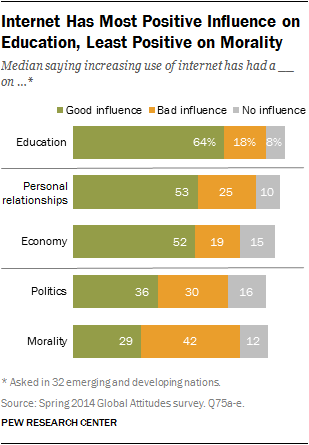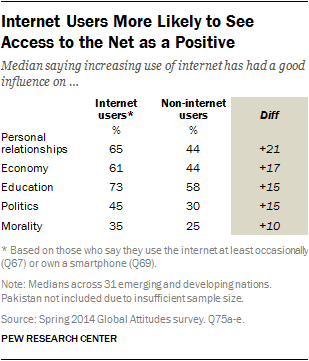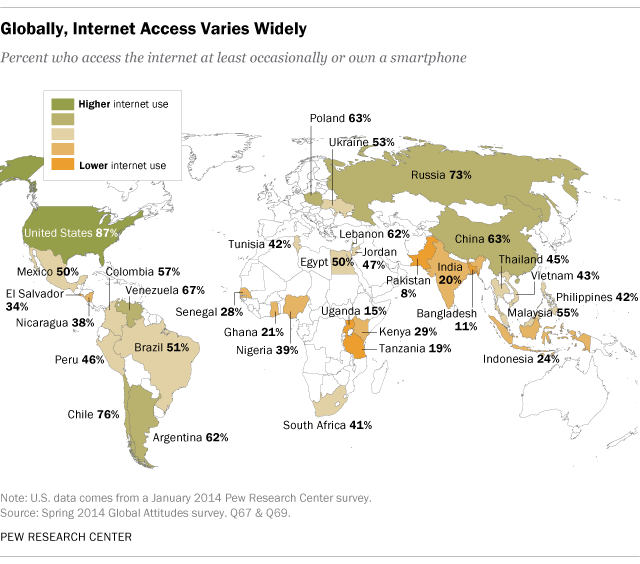A new study out this morning from Pew Research takes a deep dive into the impact that Internet access is having on emerging markets, especially in terms of how it’s shaping public opinion.
Today, tech companies like Facebook and Google have made significant investments in bringing Internet access to developing countries, the former with initiatives like Internet.org designed to offer free mobile Internet access in select geographies, and the latter with aerial projects like its Project Loon balloons or high-flying drones that would provide Internet access to previously unconnected regions. But whether or not the region’s citizens will ultimately view these moves as helpful or appreciated has yet to be examined.
While most of those reading sites like TechCrunch generally view the Internet and the access to information it provides as an overall positive, we can sometimes gloss over the realities that come alongside having a network that allows everyone in the world the ability to connect. In more recent years, we’ve seen the network abused as a tool that’s allowed the government to spy on its own citizens, as well as a place where people can anonymously harass and threaten others with violence, while hiding behind the safety of their keyboards and mobile screens.
Despite these downsides, most would rather have Internet access than be without it. But will the same hold true for those who are just now being connected for the first time? Will they eventually share these sentiments?
According to Pew Research’s study, which examined technology use in 32 emerging and developing nations, people’s thoughts on the benefits of Internet access were mixed. Those Pew spoke with were more likely to say that the Internet is a negative influence on morality, and were divided on its effect on politics. At the same time, they saw its advantages when it came to education, and to some extent, valued its effects on personal relationships and the economy.

In these emerging markets, Pew says that a median of 64% of the general population, including non-Internet users, say the Internet is a positive influence on education, and 53% feel the same about its influence on personal relationships. 52% believe it’s also a positive impact on the economy. However, only 29% say the Internet is a good influence on morality – and a further 42% go so far as to say it’s a bad influence.
These sentiments, notes Pew, are fairly consistent across the countries it studied. And there was no country where the Internet was viewed as positively influencing morality.

What’s interesting is that those who gain Internet access are more likely to feel positive about its societal influences. For instance, 65% of Internet users in the emerging markets believe the Internet is a positive for personal relationships, while only 44% of non-Internet users would agree. In addition, the more highly educated share this viewpoint, too, with 6 in 10 believing in the positive influence on this matter, while only 44% of those with less education feel the same.
Facebook, from a business perspective, is right to invest in spreading its network’s reach, Pew’s new data also supports. It seems that, once connected, those in developing regions embrace socializing online as their preferred digital activity with 86% contacting friends and family, and 82% joining a social networking site. Among the Internet users in these countries, 82% use sites like Facebook and Twitter.
Meanwhile, fewer users take advantage of the Internet to get political news (54%), get health information (46%), or get information on government or services (42%). Fewer still use their newfound access for things related to career or commerce, like job hunting (35%), making payments (22%), shopping (15%) or taking online classes (13%).
It’s unfortunate, though, that Pew’s research didn’t dig further into the questions users had about the Internet and its impacts on morality – the report doesn’t mention the specific problems people believed the Internet was to blame for, or the types of services or activities that helped to erode morality as a whole.
But given that the majority of users quickly turn to online socializing after gaining access to the web, there a likely some connection between people’s online social behavior and this shared belief. With the absence of face-to-face connections and the pressures that come with abiding by a society’s rules, people feel freer online. And that can mean they’re also freer to abuse others and to share their true thoughts, even those they wouldn’t admit to in public. Those behavioral changes could influence people to think of the Internet as a largely more negative force when it comes to morality.

The full report, which also details how users get connected, as well as what sorts of activities they engage in on a per country basis, is available here. It’s worth noting that even though the Internet is affecting more people’s lives in these regions, large numbers are still without access – across the 32 countries studied, only 44% use the Internet at least occasionally, compared with 87% of U.S. adults.